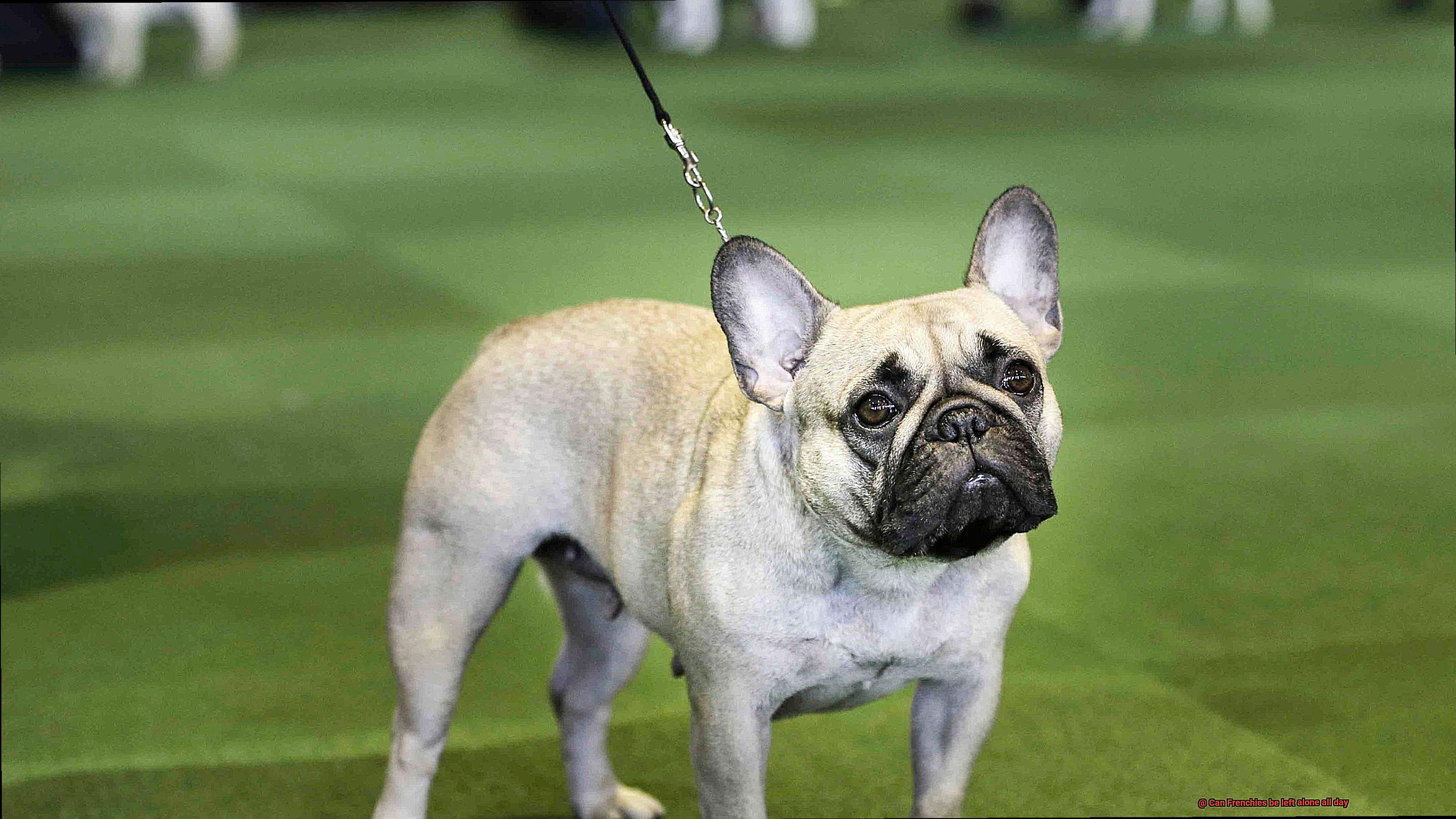Can Frenchies be left alone all day?
Picture this: you’re scrolling through Instagram, and your heart skips a beat as you stumble upon a video of a French Bulldog snorting with delight. Instantly, you’re captivated by their smushy faces, playful antics, and unwavering loyalty. It’s no wonder that these adorable companions have swiftly become the darlings of dog lovers worldwide. But amidst all the cuteness, there’s one pressing question that begs an answer – can Frenchies be left alone all day?
Today, we embark on a journey to uncover the truth behind this burning query. We’ll delve deep into the realm of French Bulldog behavior, exploring their temperament and resilience when faced with extended periods of solitude. So grab your favorite mug of coffee or tea, settle into your comfiest chair, and let’s dive headfirst into the captivating world of Frenchies as we unravel the age-old mystery surrounding their ability to thrive when left to their own devices for hours on end.
The Negative Consequences of Leaving a French Bulldog Alone
Contents
- 1 The Negative Consequences of Leaving a French Bulldog Alone
- 2 Respiratory Issues in French Bulldogs Caused by Being Left Alone
- 3 Lack of Stimulation and Exercise for French Bulldogs When Left Alone
- 4 Solutions to Avoid Leaving a Frenchie Alone All Day
- 5 Training a Frenchie to Be Comfortable With Being Left Alone
- 6 Providing a Safe Space for Your Frenchie When You Are Away
- 7 Meeting the Basic Needs of Your Frenchie Before Leaving Them Alone
- 8 Evaluating Your Lifestyle Before Committing to a French Bulldog
- 9 Conclusion
French Bulldogs, with their charming and sociable nature, are beloved companions to many. These adorable canines thrive on human interaction and crave our attention. However, leaving them alone for extended periods can have negative consequences on their well-being and behavior. Let’s explore the potential pitfalls of leaving a French Bulldog alone and how we can mitigate them.
Separation Anxiety: A Common Challenge
French Bulldogs are known for their strong bond with their owners. When deprived of this social interaction, they may experience separation anxiety, a common behavioral problem in dogs. Imagine the distress they feel when left alone all day without their beloved human. Symptoms of separation anxiety can include excessive barking, destructive behavior, house soiling, and even attempts to escape.
Health Issues Amplified
French Bulldogs are prone to certain health issues, such as brachycephalic syndrome and heat sensitivity. When left alone for long durations, they may not receive the necessary care and attention to manage these conditions effectively. Their short-nosed structure makes them more susceptible to respiratory problems, especially in hot weather. Without someone around to monitor their well-being, these health issues can worsen.
Boredom Breeds Bad Behavior
Lack of mental stimulation can be detrimental to a French Bulldog’s overall well-being. These intelligent dogs require mental challenges to prevent boredom and restlessness. When left alone without interaction or activities to keep them engaged, they may resort to undesirable behaviors like chewing on furniture or excessive licking. After all, a bored Frenchie is a mischievous Frenchie.
Loneliness Leads to Behavioral Problems
French Bulldogs thrive on companionship. They adore being in the company of their owners and may feel lonely when left alone for long durations. This loneliness can manifest in various behavioral problems, including increased anxiety, depression, or even aggression. It’s heartbreaking to think of our furry friends yearning for our presence while we’re away.
Training Hindrances
Leaving a French Bulldog alone for extended periods can hinder their training progress. Consistency and reinforcement are crucial for effective training, and the absence of these due to prolonged solitude can impede their learning and behavior development. It’s important to remember that a well-trained Frenchie is a happy Frenchie.
Physical Discomfort
French Bulldogs are not built for endurance or strenuous exercise. Leaving them alone all day without regular exercise or bathroom breaks can negatively impact their physical health and lead to discomfort or urinary accidents. It’s essential to prioritize their physical needs by ensuring they have access to walks, play sessions, and opportunities to relieve themselves.
Mitigating the Consequences
While every dog is unique and may handle being alone differently, it is generally recommended that French Bulldogs are not left alone for extended periods. Here are some steps you can take to make their alone time more manageable:
Respiratory Issues in French Bulldogs Caused by Being Left Alone
French Bulldogs are undeniably adorable, with their squished faces and playful personalities. However, their unique anatomy and sensitivity to environmental factors can contribute to respiratory issues, especially when they are left alone for extended periods of time. In this blog post, we will explore how their brachycephalic anatomy, sensitivity to temperature and humidity, and lack of mental stimulation can affect their respiratory health. So, grab a cup of coffee and let’s dive in.
Brachycephalic Anatomy
- Narrow nostrils, elongated soft palate, and smaller windpipe make breathing more difficult for French Bulldogs.
- Stress and anxiety can exacerbate these breathing difficulties.
- When left alone, Frenchies may experience increased breathing rate and struggle to catch their breath.
Sensitivity to Temperature and Humidity
- French Bulldogs have a low tolerance for extreme temperatures and high humidity levels.
- Lack of proper ventilation or air conditioning when left alone can lead to respiratory distress.
- Panting, wheezing, and other signs of discomfort may occur due to the inability to regulate body temperature.
Lack of Mental Stimulation
- French Bulldogs are highly social animals that thrive on human interaction.
- When left alone for long periods without mental stimulation, they can become anxious or distressed.
- Increased stress levels can further restrict their airflow, making it harder for them to breathe comfortably.
Tips for Mitigating Respiratory Issues:
- Provide a suitable environment: Ensure proper ventilation and maintain a comfortable temperature in your home when leaving your Frenchie alone.
- Mental stimulation is key: Leave interactive toys or puzzles that can keep them engaged and mentally stimulated.
- Consider doggy daycare or a pet sitter: If you’re away for long hours regularly, consider alternatives such as doggy daycare or hiring a pet sitter to provide companionship and supervision.
- Regular exercise: Engage your Frenchie in regular exercise to keep their physical and mental health in check.
- Monitor for signs of distress: Be aware of the signs of respiratory distress, such as excessive panting, wheezing, or difficulty breathing. Seek veterinary attention if needed.
Lack of Stimulation and Exercise for French Bulldogs When Left Alone
French Bulldogs, those little bundles of joy, are known for their playful and energetic nature. But did you know that they need proper stimulation and exercise to stay happy and healthy? When left alone for long periods of time, Frenchies can become bored, and let me tell you, that’s a recipe for trouble.
Boredom Buster #1: Behavioral Issues
Boredom Buster #2: Weight Watchers for Frenchies
Now, let’s talk about weight gain. French Bulldogs are prone to overeating when they’re not properly stimulated. Can you blame them? When there’s nothing else to do, snacking becomes the highlight of their day. But here’s the catch – excess weight can lead to a whole host of health problems like joint issues and heart disease. So, let’s keep those Frenchies fit and fabulous.
Exercise: The Key Ingredient
To keep your Frenchie happy and healthy, experts recommend at least 30 minutes to an hour of exercise every day. This can include walks, playtime at the park, or interactive toys that get their little tails wagging. Remember, a tired Frenchie is a good Frenchie.
Boredom Buster #3: Interactive Toys and Doggy Daycare
When you can’t be there to entertain your Frenchie, why not leave them some interactive toys? Puzzle toys, treat-dispensing toys, or toys that make noise or move on their own can keep their little minds engaged and their tails wagging. And if you’re really pressed for time, consider hiring a dog walker or enrolling your Frenchie in daycare. They’ll get the exercise and socialization they need while you’re away.
Creating a Stimulating Environment
When you’re not around, it’s important to create a safe and stimulating environment for your Frenchie. Fill their space with toys, create designated play areas, and make sure they have access to fresh water and comfortable resting spots. It’s all about making them feel at home.
Training: The Cherry on Top
Last but not least, training your Frenchie to be independent and comfortable in their own company can work wonders. Teaching them to enjoy their own company can help alleviate any anxiety or boredom they may experience when left alone. Plus, it’s a great bonding opportunity for you and your furry friend.

Solutions to Avoid Leaving a Frenchie Alone All Day
French Bulldogs are adorable and loving companions, but they can become anxious and bored if left alone all day. As responsible pet owners, it’s important to find solutions to avoid leaving our Frenchies alone for extended periods. In this blog post, we will explore some practical and effective strategies to keep your Frenchie happy and entertained even when you can’t be there.
Hire a Dog Walker or Pet Sitter:
One fantastic solution is to hire a dog walker or pet sitter who can visit your Frenchie during the day. They can provide exercise, bathroom breaks, and much-needed social interaction. Your Frenchie will look forward to their visits and return home tired and content.
Enroll in Doggy Daycare:
Doggy daycare is another excellent option for keeping your Frenchie entertained and socially engaged. They’ll have the opportunity to interact with other dogs under the supervision of trained professionals. It’s a stimulating environment that will prevent loneliness and separation anxiety.
Interactive Toys and Puzzles:
To keep your Frenchie mentally stimulated, invest in interactive toys and puzzles. These toys can dispense treats or challenge their problem-solving skills, providing hours of entertainment and mental exercise. They’ll stay occupied and less likely to engage in destructive behavior.
Create a Safe Space:
Setting up a safe and comfortable space for your Frenchie when they’re alone is crucial. Use a crate or designate an area with their bed, toys, and water. This will give them a sense of security and help them feel calm when you’re not around.
Background Noise:
Leaving calming music or a TV on can make your Frenchie feel less lonely and provide some background noise that mimics the presence of humans. It can help soothe their anxiety and make them feel more relaxed.
Consider a Canine Companion:
If possible, consider adopting another dog as a companion for your Frenchie. Having a furry friend can alleviate separation anxiety and provide constant companionship. Just make sure to introduce them properly and ensure they get along well.
Train for Independence:
Gradually training your Frenchie to become more independent is essential. Start by leaving them alone for short periods and gradually increase the time. Reward them for good behavior to reinforce their independence and confidence.
Training a Frenchie to Be Comfortable With Being Left Alone
French Bulldogs are known for their loving and sociable nature, which can make it challenging for them to be left alone. However, with proper training and gradual desensitization, you can teach your Frenchie to be comfortable and secure when you’re not around. In this blog post, we will explore effective strategies to help your Frenchie develop independence and feel at ease when left alone.
Gradual Alone Time Increase:
Start by gradually increasing the amount of time your Frenchie spends alone. Begin with short periods, such as a few minutes, and gradually extend the duration over time. This gradual approach will help them adjust to being alone and build their confidence.
Safe and Comfortable Space:
Create a designated area in your home where your Frenchie can feel safe and comfortable when they are alone. Set up their bed, toys, water, and any essentials in this space. It will provide them with a sense of security and familiarity when you’re not around.
Positive Reinforcement:
Use positive reinforcement techniques to reward your Frenchie for calm behavior when left alone. For example, give them treats or praise when they stay relaxed and quiet while you are away. This will help them associate being alone with positive experiences.
Pre-Departure Routine:
Establish a pre-departure routine that helps your Frenchie understand that you will always come back. For example, before leaving the house, put on your shoes, grab your keys, but then sit back down without actually leaving. Repeat this process several times, gradually increasing the distance and duration of your absence. This will help your Frenchie realize that your departure is temporary.
Exercise and Mental Stimulation:
Ensure that your Frenchie gets plenty of exercise and mental stimulation before you leave them alone. A tired dog is more likely to rest or engage in independent activities while you are away. Consider taking them for a walk or providing puzzle toys to keep them occupied.
Calming Aids:
Consider using calming aids, such as pheromone diffusers or calming music, to help relax your Frenchie when they are left alone. These products can create a soothing environment and reduce separation anxiety.
Professional Help:
If your Frenchie continues to struggle with being left alone, seek professional help from a dog trainer or behaviorist. They can provide specialized guidance and support to address any underlying issues.
Providing a Safe Space for Your Frenchie When You Are Away
Leaving your French Bulldog alone for extended periods can be challenging, as they thrive on human companionship. However, with the right steps and preparations, you can create a safe space that allows your Frenchie to feel secure and comfortable while you’re away. In this article, we’ll guide you through the process of setting up an independence fortress for your furry friend.
Choose a designated area:
Create a specific room or enclosed space where your Frenchie can retreat to when you’re not around. This area should have their bed, toys, and familiar scents to provide a sense of security. Make sure it’s free from potential hazards such as toxic plants, chemicals, or small objects that could be swallowed.
Limit access with baby gates or crates:
To prevent accidents or destructive behavior, consider using baby gates or crates to restrict your Frenchie’s access to certain areas of the house while you’re away. This helps keep them safe and minimizes the risk of them getting into trouble.
Provide mental stimulation:
Boredom and separation anxiety can be alleviated by providing mental stimulation. Leave puzzle toys or treat-dispensing toys that require problem-solving skills. These toys keep your Frenchie engaged and entertained while you’re gone.
Ensure constant access to fresh water:
Hydration is important for your Frenchie’s well-being. Consider using an automatic water dispenser to ensure they have access to fresh water at all times, even when you’re not there.
Arrange for someone to check on them:
If possible, ask a trusted neighbor, friend, or professional pet sitter to check on your Frenchie during the day. This provides human interaction and allows for bathroom breaks, reducing their time alone.
Consider doggy daycare or a dog walker:
Doggy daycare or a dog walker can be great options to provide socialization and exercise for your Frenchie while you’re away. These services can help alleviate separation anxiety and keep your Frenchie happy and active.
Create a comforting environment:
Leave some calming music or the TV on low volume to provide background noise that mimics human presence. This helps your Frenchie feel less alone and can soothe their anxiety. Experiment with different sounds to find what works best for them.
Meeting the Basic Needs of Your Frenchie Before Leaving Them Alone
French Bulldogs are social animals that can experience separation anxiety when left alone for extended periods. To alleviate their stress and anxiety, it is crucial to meet their basic needs before leaving them alone. In this blog post, we will explore the importance of addressing their exercise requirements, bathroom needs, mental stimulation, access to fresh water, and establishing a routine to ensure their well-being and minimize anxiety.
Exercise Requirements:
Frenchies are energetic dogs that require regular physical activity. Before leaving them alone, engage them in activities such as walks, play sessions, or fetch. This will tire them out and prevent restlessness or boredom.
Bathroom Needs:
Ensure your Frenchie has relieved themselves before you leave. Take them outside to their designated bathroom area or provide training pads/litter boxes indoors if necessary.
Mental Stimulation:
French Bulldogs are intelligent dogs that thrive on mental challenges. Provide them with puzzle toys, treat-dispensing toys, or engage in obedience training sessions before leaving. This will keep their minds occupied and prevent destructive behaviors.
Access to Fresh Water:
Hydration is essential for your Frenchie’s well-being. Before leaving, ensure their water bowl is filled with clean water or consider using an automatic dispenser to maintain constant access.
Establish a Routine:
Dogs thrive on consistency and knowing what to expect. Maintain a consistent schedule for feeding, exercise, bathroom breaks, and alone time. This will help your Frenchie feel secure and reduce any anxiety they may experience.
Evaluating Your Lifestyle Before Committing to a French Bulldog
Bringing a French Bulldog into your life can be a wonderful experience, but it’s important to evaluate your lifestyle before making this commitment. French Bulldogs require a special level of care and attention, and understanding your own lifestyle will help determine if you are ready to provide everything these adorable little companions need.
So, let’s dive into the key factors to consider before bringing a Frenchie into your home.
Factor 1: Time and Availability:
French Bulldogs are known for their social nature and can suffer from separation anxiety if left alone for too long. Evaluate your daily routine and consider how much time you can dedicate to your Frenchie. If you work long hours or travel frequently, it may be challenging to meet the social needs of these dogs.
Factor 2: Exercise and Mental Stimulation:
French Bulldogs may have small bodies, but they have big energy. Regular exercise is essential to keep them physically fit and mentally stimulated. Assess your availability for walks, playtime, and training sessions. If your schedule is too tight, consider whether you can hire a dog walker or enlist the help of family members.
Factor 3: Living Arrangements:
French Bulldogs are indoor dogs and thrive on human companionship. They are not suited for outdoor living or staying in a yard unsupervised. Ensure that you have enough space indoors for them to move around comfortably. Be prepared to provide air-conditioned environments during hot weather as they struggle with extreme temperatures due to their short noses.
Factor 4: Compatibility with Other Pets and Family Members:
Consider the dynamics of your household. French Bulldogs generally get along well with other animals and children, but proper supervision is still necessary. If you have existing pets or young children, make sure they will be able to coexist peacefully with a Frenchie.
Factor 5: Financial Considerations:
Owning a French Bulldog can be costly. They have specific health needs and are prone to certain conditions. Budget for regular veterinary check-ups, vaccinations, and potential medical expenses that may arise throughout their lives.
PP49oLtdd3U” >
Conclusion
French Bulldogs, affectionately known as Frenchies, are delightful and lovable companions. However, the question remains: can they be left alone all day? The answer is not a simple yes or no. While Frenchies are generally independent dogs, they do require social interaction and mental stimulation to thrive.
Leaving a Frenchie alone for extended periods can lead to separation anxiety and destructive behavior. These adorable little creatures crave human company and can become anxious if left alone for too long. It’s important to remember that Frenchies are companion dogs and thrive on being part of their family’s daily activities.
However, with proper training and preparation, it is possible for Frenchies to be left alone for shorter durations. Building up their tolerance gradually by starting with short periods of separation and gradually increasing the time can help alleviate any anxiety they may experience.
Providing them with engaging toys, puzzles, and interactive games can also keep their minds stimulated while you’re away. Additionally, leaving soothing background music or a familiar scent in their environment can help create a sense of comfort and security.
It’s worth noting that every Frenchie is unique, and their ability to tolerate being alone may vary. Some Frenchies may adapt well to being left alone for longer periods, while others may struggle more with separation. Assessing your Frenchie’s temperament and needs is crucial in determining how long they can comfortably be left alone.
In conclusion, while French Bulldogs are generally independent dogs, leaving them alone all day is not ideal for their well-being. They require social interaction, mental stimulation, and human companionship to thrive. With proper training, gradual acclimation to being alone, and providing them with stimulating activities, it is possible for Frenchies to handle shorter periods of solitude.




